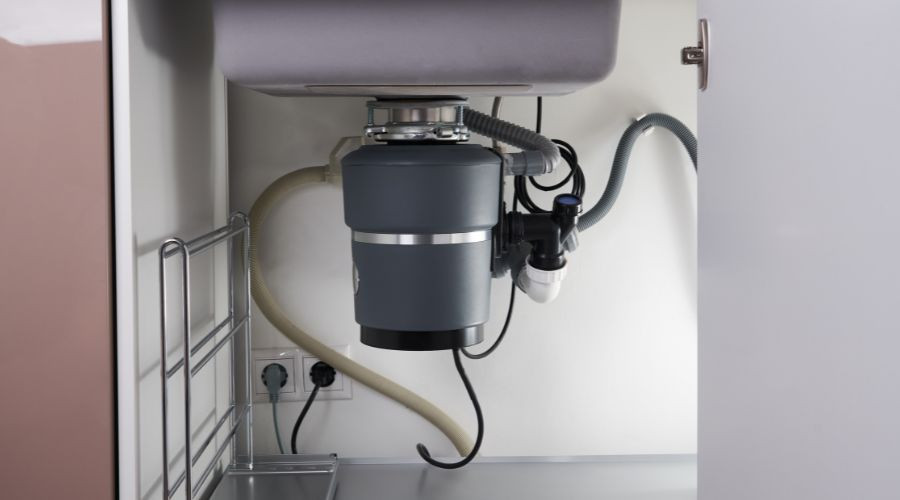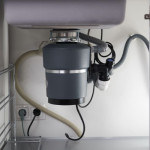Take Good Care of the Garbage Disposal to Keep It Running Well
A properly functioning garbage disposal is one of those household conveniences often taken for granted - until it stops working. This hardworking kitchen companion helps keep sinks clean and odor-free, but without proper care, it can quickly become a source of frustration, unpleasant smells, and costly repairs.
Understanding how to maintain the garbage disposal is essential for every homeowner to prevent future issues. This guide will share some tips to help better care for the garbage disposal and avoid garbage disposal repair visits.
Be Careful What Goes Down the Disposal
 A garbage disposal is designed to handle light food waste, but knowing what not to put down the disposal is crucial for its longevity and to prevent sewer line clogs. Never dispose of fibrous materials like celery stalks, corn husks, or onion skins, as these can wrap around the blades, cause jams, and clog the line. Avoid putting coffee grounds, eggshells, and pasta down the disposal, as these items can also create clogs. Grease, oils, and fats are also strictly off-limits as they solidify when cool, leading to stubborn blockages. Non-food items, including paper, plastic, glass, or metal, should also never enter the disposal.
A garbage disposal is designed to handle light food waste, but knowing what not to put down the disposal is crucial for its longevity and to prevent sewer line clogs. Never dispose of fibrous materials like celery stalks, corn husks, or onion skins, as these can wrap around the blades, cause jams, and clog the line. Avoid putting coffee grounds, eggshells, and pasta down the disposal, as these items can also create clogs. Grease, oils, and fats are also strictly off-limits as they solidify when cool, leading to stubborn blockages. Non-food items, including paper, plastic, glass, or metal, should also never enter the disposal.
What can be put safely down the disposal includes fruit and vegetable scraps, except for fibrous vegetables, potato peels, and fruit pits. Rinds from citrus fruits and small pieces of cooked meats can also go down disposals. If unsure whether something is safe to put down garbage disposals, err on the side of caution and throw it in the trash instead.
Use Cold Water and Ice
 When using garbage disposals, always run cold water while operating the disposal and for about 15-20 seconds afterward to help flush food particles through the pipes. Running cold water while operating the garbage disposal is essential for the optimal performance and longevity of the unit. Cold water helps solidify any grease or oils that may be present, allowing them to be broken down and flushed through the system rather than coating the blades and pipes.
When using garbage disposals, always run cold water while operating the disposal and for about 15-20 seconds afterward to help flush food particles through the pipes. Running cold water while operating the garbage disposal is essential for the optimal performance and longevity of the unit. Cold water helps solidify any grease or oils that may be present, allowing them to be broken down and flushed through the system rather than coating the blades and pipes.
Ice cubes can also be put down disposals and help serve as a natural cleaning agent for garbage disposals, performing two crucial functions. First, as the disposal crushes the ice, the frozen chunks help remove food particles and buildup that have accumulated on the blades and grinding components. Second, the ice helps sharpen the disposal's blades, maintaining their efficiency in breaking down food waste. Doing this every once in a while can help disposals while keeping them clean and odor-free.
Avoid Putting Too Much Down the Disposal
When disposing of acceptable food waste, feed it gradually rather than all at once to prevent overwhelming the unit. Overloading the garbage disposal is one of the most common mistakes, leading to clogs, jams, and mechanical failures. While these units are designed to handle some food waste, they have limitations on the quantity and size of items they can process effectively.
Feed food scraps gradually into the disposal while running cold water rather than stuffing large amounts in at once.
When dealing with larger food scraps, take the time to break them down into smaller, more manageable pieces before using the disposal. This measured approach allows the disposal's blades to grind each piece thoroughly before introducing the next batch.
If homeowners notice signs of problems with their disposals, they should call a plumber for garbage disposal repair to prevent the issue from causing additional problems, such as a clogged sewer line. Some signs of disposal problems include unusual sounds like grinding or clanking, bad smells, needing frequent resets, or it’s not grinding food properly,
About Cardinal Heating, Cooling, Plumbing & Electric
Cardinal Heating, Cooling, Plumbing & Electric has over 40 years of experience serving the Fitchburg area. They offer personalized solutions and high-quality workmanship. Call them for kitchen plumbing and garbage disposal services in Fitchburg, WI.



